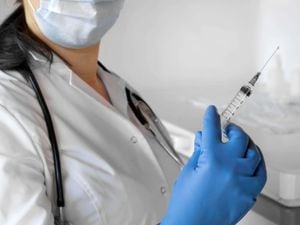Concerns raised as whooping cough cases soar
There were 553 new cases confirmed in January.

Health officials have raised concerns over a rise in the number of cases of whooping cough.
The UK Health Security Agency (UKHSA) said there were 553 new cases of whooping cough in January.
This compares with 858 cases for the whole of 2023.
Whooping cough, also known as pertussis, is a bacterial infection of the lungs and breathing tubes.

Symptoms are similar to a cold at first but after about a week patients will get coughing bouts that last for a few minutes and are worse at night.
Young babies may also make a distinctive “whoop” or have difficulty breathing after a bout of coughing.
The condition spreads very easily and can sometimes cause serious problems.
The UKHSA said that there were low case numbers during the pandemic due to reduced social mixing.
Officials warned that the increase in cases comes at a time when there has been a steady decline in uptake of the vaccine against whooping cough in pregnant women and in children.
Parents have been urged to check that their child is vaccinated against whooping cough and the UKHSA is reminding pregnant women to get the vaccine so their babies are protected at birth.
The vaccine is offered as part of the six-in-one jab when babies are eight, 12 and 16 weeks old.
The number of two-year-olds who completed their six-in-one vaccinations as of September 2023 is 92.9%, compared with 96.3% in March 2014.
Dr Gayatri Amirthalingam, UKHSA consultant epidemiologist, said: “Whooping cough can affect people of all ages but for very young infants, it can be particularly serious.
“However, vaccinating pregnant women is highly effective in protecting babies from birth until they can receive their own vaccines.
“Parents can also help protect their children by ensuring they receive their vaccines at the right time or catching up as soon as possible if they have missed any. If you’re unsure, please check your child’s red book or get in touch with your GP surgery.”
Steve Russell, national director for vaccinations and screening at NHS England, said that people can contact their GP to book in a vaccination appointment.
People with symptoms should “ask for an urgent GP appointment or get help from NHS 111”, he added.
People with whooping cough are advised to stay at home for 48 hours after starting antibiotics, or three weeks after symptoms start if they have not had antibiotics.
Last week Professor Dame Jenny Harries, chief executive of the UKHSA, said that there have been 21 deaths among babies from whooping cough since 2012.
She told BBC Breakfast: “There are deaths now – so if we talk about whooping cough for example, pertussis, we can’t protect very tiny babies.
“We have a pertussis – whooping cough – vaccination for children, usually at eight, 12 and 16 weeks, but the very tiniest children, the newborns, are the ones who are most impacted and can get very seriously ill, so we need most children to be protected so that they can’t pass it on to their young siblings.
“There’s also a maternal programme and that maternal programme rate has dropped as well – it was introduced in 2012.
“We’ve had 21 neonatal/infant deaths since that time, the last one of which was just at the end of last year. Now most of those individuals, 19 of the 21, were not vaccinated.
“So I think it’s all of the vaccination programmes are there to help people and there are very real current consequences.”
A UKHSA spokeswoman said that although newborns cannot be protected with the vaccine they can be protected through the maternal programme.





